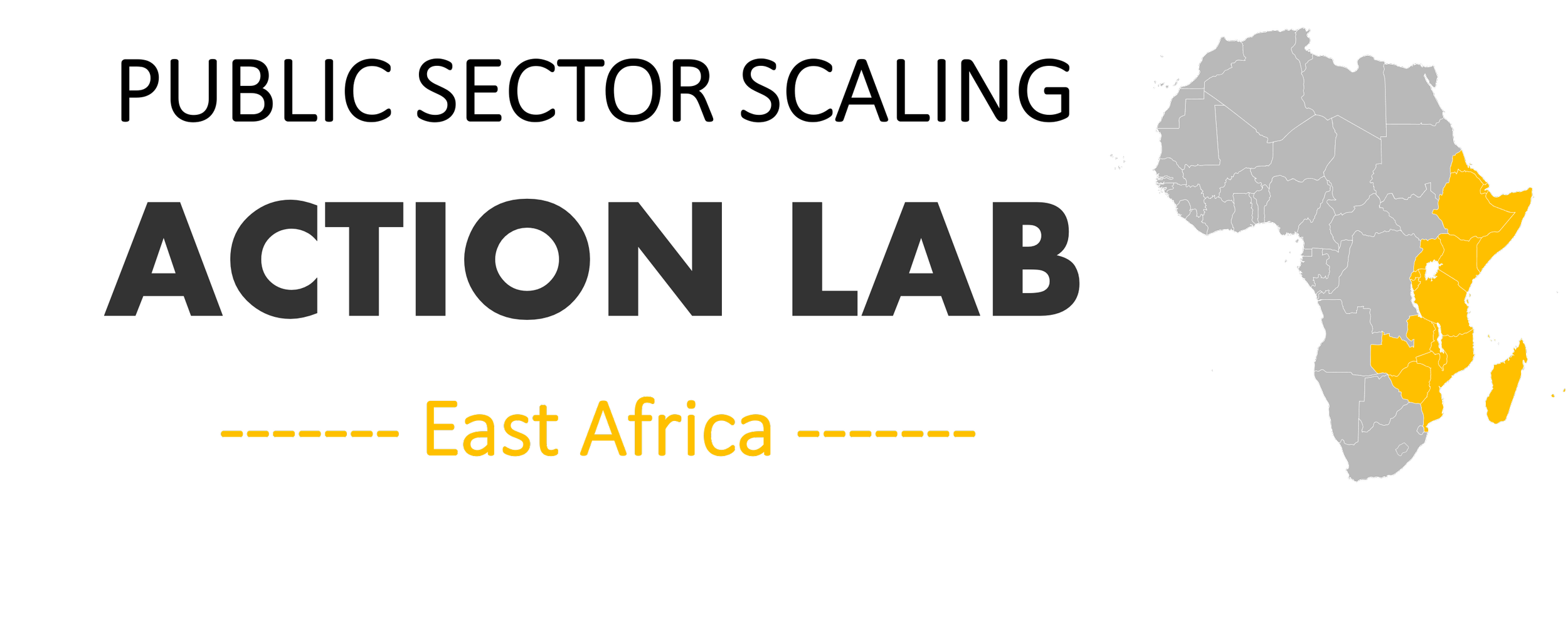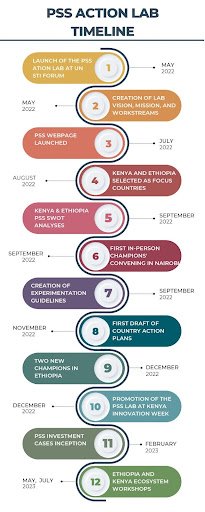Champions, Countries & Collective Selfishness: Insights from the first year of the Public Sector Scaling Action Lab
This blog is part of a series developed by Results for Development sharing learning from the design and implementation of a locally-led and demand-driven Public Sector Scaling Action Lab for East Africa. We welcome comments and insights from others working to scale up innovations within government health systems.
It's been a busy first 12 months for the Public Sector Scaling Action Lab for East Africa (hereafter referred to as the “PSS Lab”). Building on our initial ecosystem consultation phase and the official launch of the PSS Lab at the UN STI Forum on May 6th 2022, the team from Results for Development has been working closely with our inaugural cohort of PSS Champions to co-create an appropriate mission, vision and workplan for the PSS Lab. Along the way, we challenged our assumptions about what (and where) a Lab like this should focus to be impactful, articulated the shared values that would be our guide rails for the journey ahead, explored new models for collective, localised decision-making, and laid the foundations for an exciting experimental approach to helping governments scale up their chosen solutions through ‘Innovation Investment Cases’ . Key insights from this process are summarised below .
High-level ambition needs to be balanced with quick actions – As the saying goes, "There is only one way to eat an elephant: one bite at a time." Similarly, projects often have lofty goals within tight timeframes, and the key to reach them is to take incremental steps and initiate quick actions. When we embarked on defining the Lab’s Mission and Vision, we encountered challenges in establishing a feasible scope and determining the necessary work-streams and actions to guide our journey. Recognising the broad nature of public sector scaling, we understood the importance of narrowing our focus to something tangible and achievable. Taking into account the consensus among our PSS Lab Champions, we decided to focus on supporting the scale up of innovations focusing on Primary Health Care (PHC), given that PHC serves as the driving force for achieving universal health coverage across East African countries, and is a high-priority area for many local and regional governments.
Collaboration needs to be driven by shared values - In addition to developing the PSS Lab’s mission, vision and scope, we recognised the importance of articulating our shared values and beliefs. These values serve as a guiding compass for our work and continuously inform our approach. Our PSS Champions emphasised the need for a ‘value statement’ to describe the rationale, motivation, and beliefs underpinning the PSS Lab's work, as follows.
We believe that:
The continuous and widespread integration of different kinds of innovation – including new products / services, policies, partnership models and financing mechanisms – is essential to ensuring public health systems are able to adapt and respond to the changing context and needs of their populations, including the most marginalised;
The scale-up of innovation should be demand-driven and aligned with national, local and regional health priorities and needs as defined by country actors;
A wide variety of actors from different parts of the ecosystem – including government, academia, the private sector, civil society and international development partners – all play a role in supporting the resourcing, structures and processes needed for the sustainable scale-up of innovation within public health systems;
The scale-up of innovation should wherever possible advance the interoperability and integration of healthcare services delivered by different actors, using an asset-based mindset in which locally-generated solutions and resources are prioritised and leveraged in the interests of sustainability;
The exchange, synthesis and open sharing of learning around public sector scaling approaches among stakeholders within and across country borders is essential to ensure continuous improvement and mainstreaming of effective policies and practices.
These shared values provide a solid foundation for collaboration and ensure that the PSS Lab’s work is aligned with its core principles.
3. Prioritise diversity and learning in selecting initial focus countries – When deciding on which (and how many) countries to focus on, we conducted an informal assessment using diverse criteria designed by the PSS Champions themselves. A key priority was selecting countries where the PSS Champions had already established relationships with government officials and with different parts of the ecosystem to accelerate the opportunity to provide support. At the same time, the PSS Champions were keen to select countries with different health system structures to generate learning around how the PSS Lab support might need to adapt in order to be relevant and impactful. Ultimately, this led the team to select Kenya and Ethiopia as initial focus countries for the Lab. Kenya was chosed to leverage the strong appetite and interest around public sector scaling growing among county-level governments; and Ethiopia for the opportunity to explore how to build interest and collaboration around public sector scaling through a more centralized, nationally-governed health system. As such, we hope that the varying levels of ecosystem maturity and diversity of their respective health system structures will generate a strong foundation of learning around public sector scaling that the PSS Lab can leverage to support other countries in the region in the future.
4. You can never have too many Champions. As a locally-led initiative, we knew that having a strong network of PSS Champions would be essential to the success of the Lab. Our PSS Champions, who are drawn from a range of countries across the region, are the drivers of our strategy; the managers of government and ecosystem relationships; and the ‘frontline’ actors implementing PSS Lab activities. In voluntarily contributing their time, we knew that our busy PSS Champions would require a strong value proposition to maintain strong engagement and support effective collaboration within the PSS Lab, and so we transparently designed the network around a principle of ‘collective selfishness’ that ensured PSS Lab activities would also help accelerate and/or add value to the work already being undertaken by them and their respective agencies in this space. We also took the opportunity to bring them all together for an in-person workshop in Nairobi in September 2022 so that they could help deepen and extend the relationships that had begun to grow through their regular online convenings.Following the decision to focus on Kenya and Ethiopia, we then set about ensuring the PSS Champion network would have a strong base of skills, expertise and relationships in each country and then complemented this by actively involving local members of the Results for Development teams in each country office, whose insights and networks were invaluable in shaping our approach.
5. Adopt an experimental approach to finding the right service offering to governments – Rather than try to pre-determine our approach, the PSS Lab chose to adopt a government-led, demand-driven approach based around exploring practical, experimental engagements to test different ways the PSS Lab might be impactful in accelerating the scale-up of health innovations. This "learning by doing" approach allowed us to quickly move to test our assumptions around what would be relevant and helpful in this space, and to ensure we were listening and responding to government needs and capacity gaps rather than imposing our own agendas.
Taking into account all of the above activities, it’s definitely been a busy first year for the PSS Action Lab! We are committed to continuing to share our learning as our support to governments in Kenya and Ethiopia takes shape, and invite others with interest and capacity to support the PSS Lab to join us in this exciting and innovative new approach to driving impact through public sector scaling and building more innovative and resilient health systems across East Africa.
Written by: Anna Giulia Ponchia



